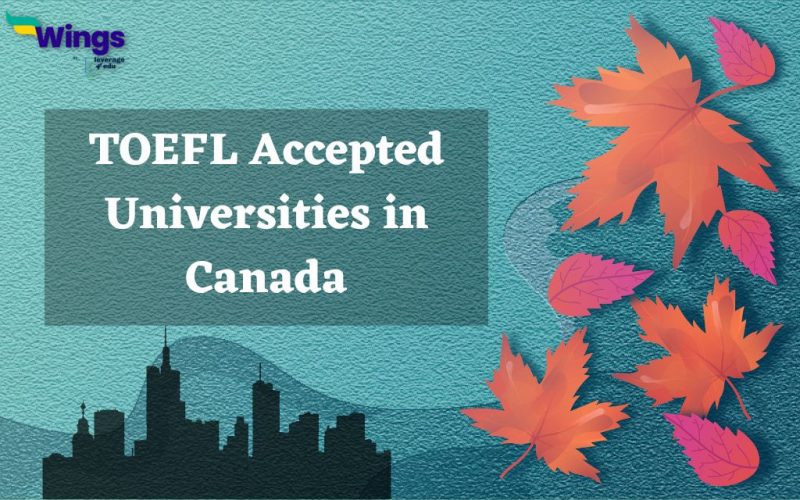TOEFL Accepted Universities in Canada: International students applying for Canadian universities are required to undergo a language proficiency test. One such exam is TOEFL, an approved English proficiency test for both immigration and employment purposes in Canada. TOEFL is recognized by over 11,000 educational institutions in 150 countries.
Nevertheless, demonstrating language proficiency remains a prerequisite for international students seeking admission to Canadian universities.
This Blog Includes:
Does Canada Recognize TOEFL?
Yes. Given TOEFL’s global acceptance, Immigration, Refugees and Citizenship Canada (IRCC) acknowledge its importance for acquiring Canadian Student Visas and gaining entry to universities.
Close to 400 Canadian universities and institutions acknowledge the TOEFL test. In this article, we will delve into the top Canadian universities that consider TOEFL scores and equip you with comprehensive details about the examination.
Also Read: How to Prepare for the NEW TOEFL Online?
Minimum TOEFL Score Required
The minimum TOEFL score demanded by Canadian universities hinges entirely on the institution and program you’re applying for. Typically, Canadian universities necessitate a minimum TOEFL score ranging from 80 to 100 on the internet-based test (iBT) for undergraduate programs, and a minimum score of 90 to 100 on iBT for post-graduate programs.
Requirements might vary among universities, with some programs specifying particular section scores (e.g., writing, reading, speaking, and listening).
Certain universities waive English proficiency criteria in favour of academic competence. Additionally, Canadian universities accept alternative English proficiency tests like IELTS or Pearson Test of English (PTE) instead of TOEFL.
It’s advisable to verify the precise prerequisites of your preferred university and program, as they could differ from the aforementioned general guidelines.
Check Out: TOEFL Preparation Tips
TOEFL Accepted Universities in Canada
As previously mentioned, over 400 universities and institutions in Canada acknowledge the TOEFL exam as a validation of language proficiency. Now, let’s see some of Canada’s finest universities that accept TOEFL scores, and are renowned for their academic distinction, cutting-edge amenities, and welcoming environment for students.
The following institutions enjoy exceptional repute and provide an extensive array of programs spanning diverse fields of study, rendering them perfect choices for driven students seeking to achieve their educational and career aspirations in Canada.
| University Name | TOEFL Score for Undergraduates | TOEFL Scores for Graduates |
| McGill University | TOEFL accepted score- 79 to 100 | TOEFL accepted score– 86 |
| Western University | TOEFL accepted score– 83 | TOEFL accepted score– Minimum 86 |
| University of Calgary | TOEFL accepted score– 80 to 108 | TOEFL accepted score- Depending on major |
| McMaster University | TOEFL accepted score– 86 | TOEFL accepted score– 92 |
| University of Ottawa | TOEFL accepted score– 86 to 96 depending on the major | TOEFL accepted score– 100 for most programs |
| Queen’s University | TOEFL accepted score– 88 | TOEFL accepted score– 88 |
| Ryerson University | TOEFL accepted score– 83 to 92 | TOEFL accepted score– 93 to 105 |
| Dalhousie University | TOEFL accepted score– 90 | TOEFL accepted score– 90 and above |
| University of Waterloo | TOEFL accepted score– 90 | TOEFL accepted score– 80 minimum and 90 in alternative |
| Simon Fraser University | TOEFL accepted score– 86 | TOEFL accepted score– 90 |
| Carleton University | TOEFL accepted score– 86 | TOEFL accepted score– 86 |
| Victoria University | TOEFL accepted score– 90 | TOEFL accepted score– 90 |
FAQs
Indeed, TOEFL scores are recognized by Immigration, Refugees and Citizenship Canada (IRCC) as valid evidence of English language proficiency for student visa applications in Canada.
Absolutely, yes. TOEFL is acceptable for obtaining a student visa for Canada. There are three main types of TOEFL: TOEFL CBT, TOEFL iBT, and TOEFL PBT, all of which are recognized as evidence of English proficiency.
For studying in Canada, a student should possess IELTS, TOEFL, or PTE scores. Furthermore, depending on the chosen course and university, additional exam results like GRE, GMAT, SAT, etc., might be necessary.
Build a plan with Leverage Edu‘s Leverage Live classes and our top trainers and strengthen your English score as well as your application so that you can secure your spot in your dream college.
 One app for all your study abroad needs
One app for all your study abroad needs















 60,000+ students trusted us with their dreams. Take the first step today!
60,000+ students trusted us with their dreams. Take the first step today!